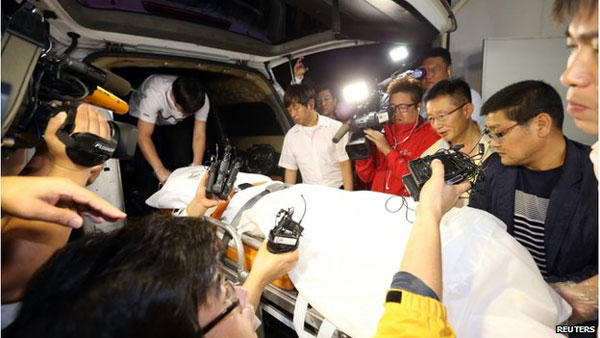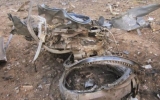South Korea ferry owner death cause 'unknown'
 Mr Yoo's heavily decomposed body was found last month in a plum
orchard in the city of Suncheon
Mr Yoo's heavily decomposed body was found last month in a plum
orchard in the city of Suncheon
Last week police identified a body found on 12 June as Yoo Byung-eun.
Mr Yoo was wanted for questioning on possible charges linked to the sinking of the Sewol ferry in April, which killed more than 300 people.
Forensic experts said the state of the body meant the manner of his death could not be determined.
"It was impossible to conclude the cause of death since Yoo's body was in a very advanced stage of decomposition," Seo Joong-seok, director of the National Forensic Service (NFS), told journalists.
The NFS had ruled out drugs or poison, he said. But there had been no way to rule out other possible causes.
"There is no way to determine whether he had suffered any wounds," Mr Seo said. "And as the intestines were so badly decomposed, we were unable to determine any disease as a cause."
Police have been criticised for failing to connect the body, which spent six weeks in the mortuary, with Mr Yoo, who was the subject of a lengthy manhunt.
Prosecutors have revealed that he hid in a cupboard at his holiday home to evade arrest. His body was found just 2.5km from his cabin, in a plum orchard.
Son arrested
Mr Yoo owned Chonghaejin Marine Co, which operated the Sewol.
It sank on 16 April off Jeju island, killing most of its passengers including scores of high-school students. Investigators say it had been illegally modified to carry more passengers and cargo, and was overloaded.
Mr Yoo was wanted for questioning on possible charges of embezzlement and criminal negligence.
Police also detained Mr Yoo's eldest son, Yoo Dae-gyun, on Friday.
Yoo Dae-gyun, who reportedly spent two months on the run, was a shareholder in the ferry operator company.
The sinking of the Sewol triggered widespread grief and anger at the government, which has promised to overhaul its bureaucracy and improve its emergency response.
Two separate trials - one for the vessel's captain and crew, and another for officials at Chonghaejin Marine - began last month.
BBC
 Seminar seeks ways to boost ASEAN - Latin America connectivity
Seminar seeks ways to boost ASEAN - Latin America connectivity
 Indonesia seeks India's help in health education
Indonesia seeks India's help in health education
 Indonesia named world's most generous country in 2024
Indonesia named world's most generous country in 2024
 Philippines: Over-4m-high floodwaters make thousands of houses submerged
Philippines: Over-4m-high floodwaters make thousands of houses submerged
 Singapore’s public sector records carbon reduction in 2023
Singapore’s public sector records carbon reduction in 2023
 Pressure facing the EU on its growth track
Pressure facing the EU on its growth track
 Efforts boosted to combat transnational organised crime
Efforts boosted to combat transnational organised crime
 Nearly 200 terror suspects arrested in Indonesia in two years
Nearly 200 terror suspects arrested in Indonesia in two years
 Vietravel launches tourism joint venture in India
Vietravel launches tourism joint venture in India
 Vietnam willing to enhance int'l cooperation in transnational crime combat
Vietnam willing to enhance int'l cooperation in transnational crime combat



